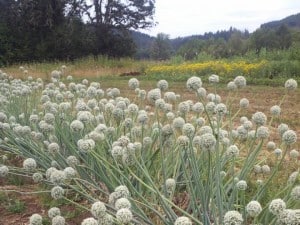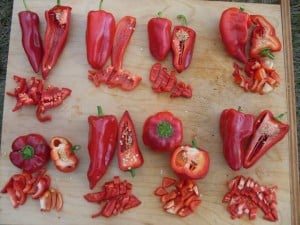Rye Ramble (from the 2015 Adaptive Seeds Catalog)
The Control of Seed and Seed Sovereignty
At Adaptive Seeds, we talk about our work of Bringing Biodiversity Back. Part of that, of course, is growing and stewarding seed and providing you with good seed stock for your own seed saving efforts. But seed work isn’t only done in the field, and preserving seed sovereignty and freedom takes more than just saving seeds. Working to keep seeds free of control mechanisms, such as patenting, is another important aspect of promoting and preserving agricultural biodiversity, as is building awareness about what seed control mechanisms exist.
We often feel like outliers in the seed world because we wish to keep seed a free, sovereign community asset that is passed down between the generations and between friends. A growing number of people share this pro-sovereignty perspective and we are excited to be part of this community. The more I think about all the different forms of seed control schemes, the more I realize that it is very strange to try to empower seed freedom. It seems like the multinational seed industry is desperately trying to put our collective inheritance into proprietary bondage for the benefit of their shareholders as quickly as possible.
You might think, “Your seeds are not free, they cost money.” So what is meant by free? Like open source software we believe seeds should be, Free as in speech, not as in beer. In a metaphorical sense I see all seed as free and what we get paid for is not the seed per say but the service of stewardship and production of a precious gift. A seed is a living organism that has intrinsic value and a long history, of which we seed stewards have only contributed a small, very recent part. We can’t own that.
The concept of seed ownership is problematic in part because it is rooted in entitlement philosophy. As humans we all have a little bit of this philosophy always under the surface. It is a trait that helps us survive in competitive situations of scarcity, but I think it is inappropriate in situations of abundance. As an overt practice it is more common in institutions and businesses (especially in regards to Intellectual Property rights), than in our personal behavior.
An Entitlement Philosophy in regards to seeds might sound like this: “I worked really hard to grow, cross, select, trial this seed and then sit around thinking. Therefore I deserve to extort payment from anyone who wants to save this seed and start from where I left off. Never mind that I didn’t start from scratch. I only added a very small part to a massive historical phenomenon. Now you must pay me to do the same because I deserve it.”
Common mechanisms for seed control
HYBRIDS
Yes, hybrids are a great way to breed good, uniform varieties quickly. But most of the value to the seed company is that you have to continually buy it from them because they have a monopoly. This monopoly is mostly what we are paying for and we are certainly paying through the nose.
CELL FUSION MALE STERILITY
These pollen sterile varieties are usually hybrids and they provide an additional level of control. Seed from these varieties cannot usually be saved and the traits from the sterile parent are “locked up” and only available to the company that produced the parents of the cross. I see cell fusion hybrids as being rather diabolical and a kind of Terminator Seed. See 2014s Rye Ramble Cell Fusion Hybrid Seed is Creepy.
PLANT VARIETY PROTECTION (PVP)
PVP is the kinder, gentler seed control mechanism, making it illegal to produce the seed for sale without permission for a 20 year period. This monopoly is nicer than a SWAT team because it allows seed saving for personal use and allows for making crosses in breeding projects. I understand why many seed companies and plant breeders approve of PVPs, but I see PVPs as the “Patriot Act of Plants” leading to the “Police State of Utility Patents.”
UTILITY PATENTS
The evil spawn of the United States Patent and Trademark Office. As originally intended patents should be for physical inventions not for living organisms. Utility patents on seed are becoming more and more common. Salanova® and multi-leaf lettuce for example, are full size heads that when cut make uniform size small leaves for salad mix. This trait is patented by Dutch seed company Rijk Zwaan (Utility Patent 6,320,104). Now no one else can breed a lettuce that does this without risking patent infringement. To dig deeper into this murky topic check out Frank Morton’s article, Plant Patents on Common Vegetables.
TRADEMARKING
Trademarks grant exclusive rights over the name of a variety and are more common in the nursery business. The ubiquitous trademark is sometimes used to control seed, as with the Pico Pardal Garbanzo Bean in Spain (see description in the Adaptive Seeds Catalog). Another example is the grain Kamut®, which is an ancient variety of Khorasan wheat trademarked by Kamut International. They use the Kamut® trademark to control the quality of goods sold under the name Kamut®. For example, it must be organic. The owners of the trademark claim that anyone may use the name Kamut® free of charge if they follow the guidelines. Interesting, but I’m skeptical.
STEWARDSHIP AGREEMENTS and LIMITED USE LICENSES
You thought these seed licenses were only for industrial farmers growing GMOs? Think again. I opened a conventional seed catalog for commercial growers recently that had Stewardship Agreements and Limited Use Licenses in the back pages of the catalog, with a signature required prior to purchase. These are equivalents to GMO seed “bag tags” (tags telling you that by opening the bag you agree to the license) and they prohibit any seed saving by the purchaser. It is Orwellian Newspeak to call this a “Stewardship Agreement,” and they are full of creepy legalistic jargon covering up a veiled threat to throw you in jail or make you pay a fine if you do not obey. What will seed companies think of next to force people into giving them more money?
Possibilities for seed sovereignty and true stewardship
We do need to make a living and I believe in paying people fair wages for productive work. But enabling seed breeders to make a living is different than an artificial state-sponsored legal mechanism to establish a monopoly on natural products and their natural propagation. A system that allows the patenting of seed (or any other seed control mechanism) relies on the theft of prior art – not only the prior art of seed stewards who came before, but also of Nature.
I believe that the breeding of seed should be paid work just like any normal job. Seed work is creative. Once this creative work is done, it should be freely released to be added and improved upon. Attribution of stewardship is something that shows respect to the seed steward, which is why we do our best to acknowledge seed stewardship in our descriptions.
A wonderful new alternative to all this seed control madness exists. Launched in April of 2014, the Open Source Seed Initiative seeks to Free the Seed with an open source licensing agreement (www.osseeds.org). Open Source Seed comes with a “bag tag” of its own, which “is intended to ensure your freedom to use the seed contained herein in any way you choose, and to make sure those freedoms are enjoyed by all subsequent users.”
We fully support this initiative and plan on releasing all the seed we breed as open source seed. We also believe that seed bred at our public land grant universities should be licensed as Open Source, and the breeding work should be publicly funded. At this point breeding projects at public universities are partly funded through PVP-generated royalties.
There are, of course, other ways to support Free Seed. Keeping the story with the seed is an important aspect to seed freedom. If the story of seed, including its traits, have been documented, any patents on those traits can be challenged.
I encourage donating to independent public domain plant breeders to help enable their work. I am no longer in support of “so called” voluntary royalty funny-business , as “Voluntary royalty” is a contradiction in terms. It is so much more generous and honest, with no strings attached, to simply donate to a project. This is why we give a portion of the sales of some varieties to the breeder – for us this kickback is more a way to pay it forward, to help support future breeding projects.
I hope this quick overview helps to clarify what we are up against in our struggle to Bring Biodiversity Back to our food system and to maintain seed sovereignty. We hold to our original convictions that none of our seeds ever be proprietary hybrids (F1), patented, PVP, or genetically modified (GMO). Free the Seed!
Andrew Still – Adaptive Seeds – Crawfordsville, Oregon – December 2014.
—
In addition there is a really cool project started in Benton County, Oregon that aims to protect heritage seed. They are working to pass a community rights ordinance that would protect heritage seed along with many other things. “Benton Food Freedom is promoting YES on 2-89 to protect our local food system from GMO pollution by asserting the rights of nature and our community over those claimed by corporations and the state.” Please check them out at: bentonfoodfreedom.org.


I would like to know what is the difference between using Cisgenic genetically engineered cell fusion CMS in organic and nonorganic hybrid seed production and Monsanto’s GE Terminator gene in seed production which causes plant sterility?
Cytoplasmic Male Sterility (CMS) is a sometimes naturally occurring “genetic defect” which can prevent a plant from producing pollen. Fertility can often be restored by crossing in a restorer gene .
Cell-fusion CMS is an artificial type of male sterility that cannot be restored and any cross into this type of plant will produce seed, but the F1 will continue to be male sterile, always needing pollen from a non CMS plant to produce seed.
I don’t know much about the GMO Terminator seed, but I am assuming that it is both male and female sterile. Which is a total evolutionary dead end.
Thank you. Magnificent! I’ll share this extensively.
Absolutely wonderful write up. Thank you! Seed sovereignty is where it’s at.
Many thanks from Australia for this excellent article. I will share it with our family farmers here! Keep up the great work!!
awesome article!
Can we get and purchase seed of these varieties I Pakistan
I am very interested in your work that you’re trying to put forth
I am very pleased to hear of the ordinance Benton County is passing to protect the freedom of seeds. Proactive. I hope it catches on in other communities.